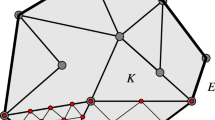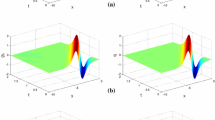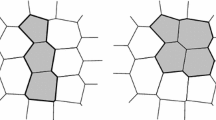Abstract
In Cockburn and Shen (SIAM J Sci Comput 38(1):A545–A566, 2016) the authors propose the first hybridizable discontinuous Galerkin method (HDG) for the p-Laplacian equation. Several iterative algorithms are developed and tested. The main purpose of this paper is to provide rigorous error estimates for the proposed HDG method. We first develop the error estimates based on general polyhedral/polygonal triangulations, under standard regularity assumption of the solution, the convergence analysis is presented for \(1<p<2\) and \(p>2\). Nevertheless, when p approaches to the limits (\(p \rightarrow 1^+\) or \(p \rightarrow \infty \)), the convergence rate shows degeneration for both cases. Finally, this degeneration can be recovered if we use simplicial triangulation of the domain with sufficient large stabilization parameter for the method.
Similar content being viewed by others
References
Araya, R., Solano, M., Vega, P.: Analysis of an adaptive HDG method for the Brinkman problem.IMA. J. Numer. Anal. (2018). https://doi.org/10.1093/imanum/dry031
Barrett, J.W., Liu, W.B.: Finite element approximation of the p-Laplacian. Math. Comput. 61, 523–537 (1993)
Buffa, A., Ortner, C.: Compact embeddings of broken Sobolev spaces and applications. IMA J. Numer. Anal. 29, 827–855 (2009)
Burman, E., Ern, A.: Discontinuous Galerkin approximation with discrete variational principle for the nonlinear Laplacian. C. R. Math. Acad. Sci. Paris 346, 1013–1016 (2008)
Bustinza, R., Lombardi, A.L., Solano, M.: An anisotropic a priori error analysis for a convection-dominated diffusion problem using the HDG method. Comput. Methods Appl. Mech. Eng. 345, 382–401 (2019)
Chen, Y., Cockburn, B., Dong, B.: Superconvergent HDG methods for linear, stationary, third-order equations in one-space dimension. Math. Comput. 85(302), 2715–2742 (2016)
Chen, H., Qiu, W., Shi, K.: A priori and computable a posteriori error estimates for an HDG method for the coercive Maxwell equations. Comput. Methods Appl. Mech. Eng. 333, 287–310 (2018)
Chow, S.-S.: Finite element error estimates for non-linear elliptic equations of monotone type. Numer. Math. 54, 373–393 (1989)
Chung, E., Efendiev, Y., Shi, K., Ye, S.: A multiscale model reduction method for nonlinear monotone elliptic equations in heterogeneous media. Netw. Heterog. Med. 12, 619–642 (2017)
Cockburn, B., Gopalakrishnan, J., Lazarov, R.: Unified hybridization of discontinuous Galerkin, mixed and continuous Galerkin methods for second order elliptic problems. SIAM J. Numer. Anal. 47, 1319–1365 (2009)
Cockburn, B., Gopalakrishnan, J., Nguyen, N.C., Peraire, J., Sayas, F.-J.: Analysis of HDG methods for Stokes flow. Math. Comput. 80(274), 723–760 (2011)
Cockburn, B., Gopalakrishnan, J., Sayas, F.-J.: A projection-based error analysis of HDG methods. Math. Comput. 79, 1351–1367 (2010)
Cockburn, B., Quenneville-Bélair, V.: Uniform-in-time superconvergence of the HDG methods for the acoustic wave equation. Math. Comput. 83(285), 65–85 (2014)
Cockburn, B., Sayas, F.-J.: Divergence-conforming HDG methods for Stokes flows. Math. Comput. 83, 1571–1598 (2014)
Cockburn, B., Shen, J.: A hybridizable discontinuous Galerkin method for the \(p\)-Laplacian. SIAM J. Sci. Comput. 38(1), A545–A566 (2016)
Cockburn, B., Shi, K.: Superconvergent HDG methods for linear elasticity with weakly symmetric stresses. IMA J. Numer. Anal 33(3), 747–770 (2012)
Cockburn, B., Shi, K.: Devising HDG methods for Stokes flow: an overview. Comput. Fluids 98, 221–229 (2014)
Cockburn, B., Zhang, W.: A posteriori error analysis for hybridizable discontinuous Galerkin methods for second order elliptic problems. SIAM J. Numer. Anal. 51, 676–693 (2013)
Cui, J., Zhang, W.: An analysis of HDG methods for the Helmholtz equation. IMA J. Numer. Anal. 34, 279–295 (2014)
Diening, L., Köner, D., Růžička, M., Toulopoulos, I.: A local discontinuous Galerkin approximation for systems with p-structure. IMA J. Numer. Anal. 34, 1447–1488 (2014)
Dong, B.: Optimally convergent HDG method for third-order Korteweg–de Vries type equations. J. Sci. Comput. 73, 712–735 (2017)
Ebmeyer, C., Liu, W.B.: Quasi-norm interpolation error estimates for finite element approximations of problems with \(p\)-structure. Numer. Math. 100, 233–258 (2005)
Egger, H., Schöberl, J.: A hybrid mixed discontinuous Galerkin finite-element method for convection–diffusion problems. IMA J. Numer. Anal. 30, 1206–1234 (2010)
Farhloul, M.: A mixed finite element method for a nonlinear Dirichlet problem. IMA J. Numer. Anal. 18, 121–132 (1998)
Farhloul, M., Manouzi, H.: On a mixed finite element method for the p-Laplacian. Can. Appl. Math. Q. 8, 67–78 (2000)
Glowinski, R., Marrocco, A.: Sur lapproximation, par éléments finis dordre un, et la résolution, par pénalisation-dualité, d’une classe de probl\(\grave{e}\)mes de Dirichlet non lineaires. RAIRO Anal. Numér. 9, 4176 (1975)
Gopalakrishnan, J., Solano, M., Vargas, F.: Dispersion analysis of HDG methods. J. Sci. Comput. 77, 1703–1735 (2018)
Griesmaier, R., Monk, P.: Error analysis for a hybridizable discontinuous Galerkin method for the Helmholtz equation. J. Sci. Comput. 49, 291–310 (2011)
Hirn, A.: Approximation of the p-Stokes equations with equal-order finite elements. J. Math. Fluid Mech. 15, 65–88 (2013)
Karakashian, O.A., Pascal, F.: Convergence of adaptive discontinuous Galerkin approximations of second-order elliptic problems. SIAM J. Numer. Anal. 45, 641–665 (2007)
Kawohl, B.: On a family of torsional creep problems. J. Reine Angew. Math. 410, 1–22 (1990)
Ladyz̆enskaja, O.A.: New equations for the description of the motions of viscous incompressible fluids, and global solvability for their boundary value problems. Tr. Mat. Inst. Steklova 102, 85–104 (1967)
Moro, D., Nguyen, N.C., Peraire, J.: A hybridized discontinuous Petrov–Galerkin scheme for scalar conservation laws. Int. J. Numer. Methods Eng. 91(9), 950–970 (2012)
Nguyen, N.C., Peraire, J., Reitich, F., Cockburn, B.: A phase-based hybridizable discontinuous Galerkin method for the numerical solution of the Helmholtz equation. J. Comput. Phys. 290, 318–335 (2015)
Nguyen, N.C., Peraire, J., Cockburn, B.: High-order implicit hybridizable discontinuous Galerkin methods for acoustics and elastodynamics. J. Comput. Phys. 230, 3695–3718 (2011)
Nguyen, N.C., Peraire, J.: An adaptive shock-capturing HDG method for compressible flows. In: 20th AIAA Computational Fluid Dynamics Conference, AIAA Paper 2011–3060 (2011)
Oikawa, I.: A hybridized discontinuous Galerkin method with reduced stabilization. J. Sci. Comput. 65, 327340 (2015)
Peres, Y., Sheffield, S.: Tug-of-war with noise: a game-theoretic view of the p-Laplacian. Duke Math. J. 145, 91–120 (2008)
Qiu, W., Shen, J., Shi, K.: An HDG method for linear elasticity with strong symmetric stresses. Math. Comput. 87(309), 69–93 (2018)
Qiu, W., Shi, K.: A mixed DG method and an HDG method for incompressible magnetohydrodynamics. IMA J. Numer. Anal. (2017). https://doi.org/10.1093/imanum/dry095
Rhebergen, S., Wells, G.N.: A hybridizable discontinuous Galerkin method for the Navier–Stokes equations with pointwise divergence-free velocity field. J. Sci. Comput. 76(3), 1484–1501 (2018)
Showalter, R.E., Walkington, N.J.: Diffusion of fluid in a fissured medium with microstructure. SIAM J. Math. Anal. 22, 17020–1722 (1991)
Soon, S.-C.: Hybridizable Discontinuous Galerkin Methods for Solid Mechanics. Ph.D. Thesis, University of Minnesota (2008)
Author information
Authors and Affiliations
Corresponding author
Additional information
Publisher's Note
Springer Nature remains neutral with regard to jurisdictional claims in published maps and institutional affiliations.
Weifeng Qiu is supported by a Grant from the Research Grants Council of the Hong Kong Special Administrative Region, China (Project No. CityU 11302014)
As a convention the names of the authors are alphabetically ordered. Both authors contributed equally in this article.
Rights and permissions
About this article
Cite this article
Qiu, W., Shi, K. Analysis on an HDG Method for the p-Laplacian Equations. J Sci Comput 80, 1019–1032 (2019). https://doi.org/10.1007/s10915-019-00967-6
Received:
Revised:
Accepted:
Published:
Issue Date:
DOI: https://doi.org/10.1007/s10915-019-00967-6




